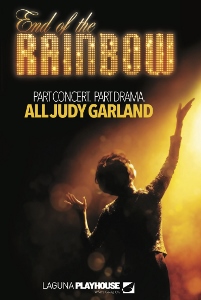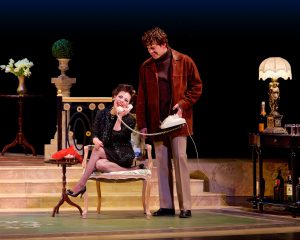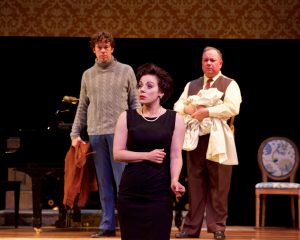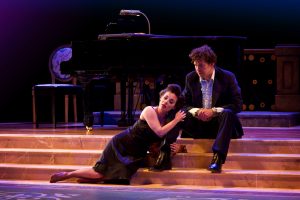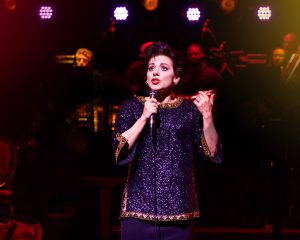THE LEGEND THAT GOT AWAY
No, this show isn’t how fans want to remember Judy Garland at the bittersweet end. End of the Rainbow, Peter Quilter’s sardonic salute to a star on the skids, is a sometimes-sadistic portrait of an imploding diva. A festering production at Laguna Playhouse, Quilter’s retro take on “Little Girl Blue” is a 145-minute tailspin into a train wreck that collides with a car crash on the edge of doom. Thanks to Angela Ingersoll’s Judy, magnificently miserable and still electrically entertaining, it’s also heartbreaking. We see, hear, taste and feel a self-destructive legend who admits that only immortality can atone for her crack-up of a career. No star is born here, just lost forever.
“Judy’s back!” is more a cry for help than a triumphant return. The scene of this comeback crime: a small suite in London’s Ritz Hotel. It’s December 1968 and the not-so-divine Judy is there to do a “Talk of the Town” concert at the Hippodrome. That is if she shows up sober or snookered, doesn’t fall asleep, collapse onto the piano or walk out, and can remember notes and lyrics. If we didn’t know already, we taste the price that the former Frances Ethel Gumm (b. 1922) paid for our pleasure. So with this transfer of last year’s La Mirada Theatre production, an entire audience can take a one-way guilt trip to the edge of Oz, mourning a lost lady whose childhood was stolen by MGM and who never got back to Kansas after all.
Needy, self-pitying, frightened, manic, and volatile, Ingersoll’s elaborately messed-up 47-year-old “Dorothy Gale” is necessarily obsessed with the “little things” because she’s never been good at the “big picture.” Liza’s mother is accompanied by her fiancé-manager Mickey Deans (Zachary Ford), a nobody club owner who will be her fifth and last husband before, also in London, she succumbs to an overdose on June 22, 1969 (possibly fueling the Stonewall Riots later that month).
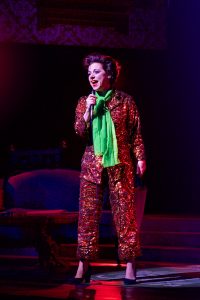 Also purporting to protect Judy is her doggedly loyal English music director and accompanist Anthony Chapman (Jon Steinhagen), a gay admirer who wants to save Judy from dying of fame. He will give her the gift of quiet domesticity after so much sound and fury signifying nothing, namely unconditional love (and no threatening sex), the only kind she could ever accept.
Also purporting to protect Judy is her doggedly loyal English music director and accompanist Anthony Chapman (Jon Steinhagen), a gay admirer who wants to save Judy from dying of fame. He will give her the gift of quiet domesticity after so much sound and fury signifying nothing, namely unconditional love (and no threatening sex), the only kind she could ever accept.
To say the least, it’s no picnic enduring Judy on this “rainbow tour” — and not just because she swallows anything (including medicine for doggy mange) and doesn’t pay her bills (just her dues). No sweet soubrette out of Meet Me in St. Louis, this foul-mouthed shrew would be an insult comic if she were remotely funny. Pushing her (bad) luck, our pill-popping, chain-smoking Judy is out of control, bent on booze (“Whenever I drink water, I feel like I’m missing out on something”), and furious at the fans — even the gay true-believers — who want to suck her soul and see her fail. She’s desperate for kneejerk reassurance 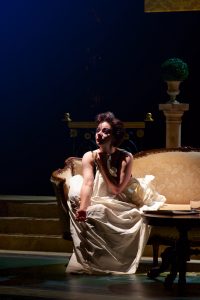 from dullard Mickey. “I want to be loved down here,” she cries, meaning real life, not in front of footlights. But, perversely, this drama queen — no, empress — does everything she can to alienate everyone around her, like a BBC interviewer (Nicholas Mongiardo-Cooper) who’s utterly gob-smacked by her incoherent paranoia.
from dullard Mickey. “I want to be loved down here,” she cries, meaning real life, not in front of footlights. But, perversely, this drama queen — no, empress — does everything she can to alienate everyone around her, like a BBC interviewer (Nicholas Mongiardo-Cooper) who’s utterly gob-smacked by her incoherent paranoia.
At times unwatchable with its recipe of resentment and recriminations, End of the Rainbow could be, like its subject, a freak show or a sewer tour. Except that Ingersoll, on stage, in charge and surging with star quality, also delivers the dreamgirl-next-door. With a backup band and Steinhagen’s impeccable musical direction, the public Judy can sing no wrong: Looking and often sounding exactly like the essential original, Ingersoll tears out her heart and the stuffing from Garland favorites, including “The Man That Got Away,” “You Made Me Love You,” “The Trolley Song,” “For Me and My Gal,” “Come Rain or Come Shine,” and, of course, the indelibly innocent “Over the Rainbow,” complete with the intro left out in 1939.
Ingersoll registers everything grand about Garland — the vulnerable tremolo, the flirtatious warble, the velvet vocalizing, the agonizing eagerness to please, the belting to the balcony. It’s the once and future Judy who died for her sins more than ours. A gem of frustrated ardor, Steinhagen’s Anthony is every gay man who ever whispered “Let’s put on a show!”
Inevitably, on this “date with Judy” — superbly shaped by Michael Matthews — we take home the Garland we prefer. If we pick the headliner/standard bearer, we still can’t ignore the hophead and pooper at her own party. If we pick the latter, well, she made us love her (we didn’t want to do it). She wanted it so much. And now we can never say we don’t know why.
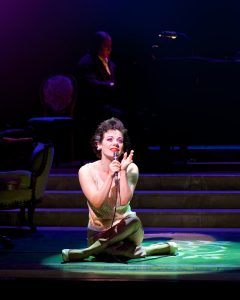 photos by Jason Niedle
photos by Jason Niedle
La Mirada Theatre for the Performing Arts/
McCoy Rigby Entertainment Production
End of the Rainbow
Laguna Playhouse
606 Laguna Canyon Drive in Laguna Beach
ends on September 2, 2018
for tickets, call 949.497.2787
or visit Laguna Playhouse
